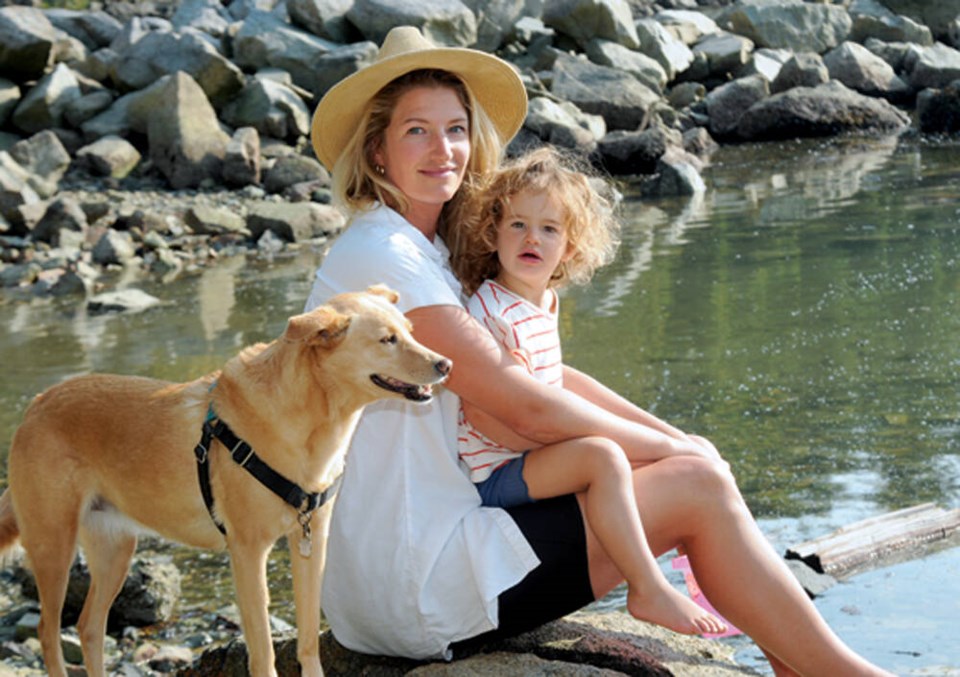A West Vancouver mother has been awarded one of the most prestigious North American awards for bravery for her actions in rescuing a teen who was swept out to sea off West Vancouver’s Dundarave Beach in September.
Emilyn Golden, 34, is among – and only Canadian – announced by the Carnegie Hero Fund Commission on Monday.
The award is .
Golden was at Dundarave Beach with her two young children on Sept. 9 when she heard people screaming nearby. When she was told a boy with autism who didn’t swim well had been swept out into the inlet, Golden didn’t hesitate to act, jumping into the cold ocean to go after him.
At the time, there was a strong current and the boy was already about 200 metres out to sea. But Golden said she knew she was a strong swimmer and was afraid the boy could die if someone didn’t reach him soon.
Not acting was “not something I even thought about,” she said at the time.
When she finally caught up with him, she discovered the boy was a teenager, easily bigger than she was, who was fully clothed and who swam away from her in fear.
Golden realized she had to change tactics fast, talking to the teen calmly and lightly and making it a game to swim back to shore together.
Eventually, Golden managed to grab his shirt and continue side-stroking towards the beach, while holding him up.
It was difficult going, she said.
“I was swimming with him as hard as I could back to shore. The current was so strong, it was still taking us out to sea, out to Spanish Banks.”
The drama ended when a zodiac from the Kitsilano Coast Guard station arrived and plucked both the boy and Golden from the water about 150 metres offshore.
Golden said after she was nominated for the Carnegie Medal, there was an extensive process to go over her actions that day, which made her realize the danger she had put herself in.
“You don’t get the award unless it’s obvious that you put your life at risk to save someone else,” she said. “Would it have changed my actions? … I don’t think it would have.”
She said the most frightening part was swimming back to the beach, when she realized the teen was becoming hypothermic and in danger of starting to drown, raising the possibility he might try to grab her in a panic and pull her under.
“I was thinking of all those things,” she said.
Golden grew up swimming in the ocean off West Vancouver. She took a lifesaving class as a young teenager but said the biggest help in staying calm was her regular cold ocean swimming in winter months which has taught her to use breathing to stay focused.
“That’s truly what enabled me to stay calm and in control of that situation,” she said.
Golden said being named as a medal recipient has made her both proud and humbled, especially when reading about the acts of bravery performed by some of the others being honoured. Four of those receiving medals died while saving or attempting to save others.
The Carnegie Medal has been awarded to 10,355 individuals since the inception of the Pittsburgh-based fund in 1904.
Golden was also previously given the Award of Merit from the West Vancouver Police Board for her actions.
Golden said her five-year-old will be among the most excited to see the medal when it arrives.
“He’s old enough to be fully aware of what happened,” she said. “To this day I can’t introduce myself to someone without him saying that I’m a hero and then explaining the whole story.”
Having something as tangible as a medal will be “really cool for him to see,” she said.
Mostly, Golden said she hopes others are inspired by her story to step in and help others when they can.
“I think society has so much fear of everything – a fear of getting hurt, fear of getting sued, fear of this and fear of that – they don’t put themselves out there to help others. I hope it encourages and inspires other people to do so.”




